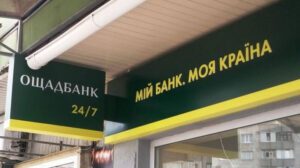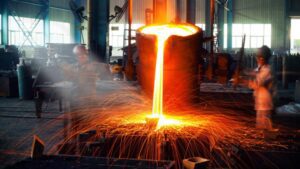
Oschadbank sales at online auction OpenMarket the right of claim under the loan agreement, as well as the right under the security agreements (mortgage, collateral, pledge) with the borrower LLC Ukrkava.
The estimated opening lot price is UAH 229,753,161.
The agreements are secured by:
The lot will be sold at the classic English auction through electronic trade based on the establishment of opening price as minimum for further trading over the course of which it increases, and the asset sale price includes the maximum bid offered by one of the participants.
Auction will take place on November 12.
Initial fee for participation is UAH 11,487,658
Find out more details about the lots on web-sites of SETAM and Oschadbank
The sixth Kyiv iGaming Affiliate Conference will take place on November 4, gathering everyone who drives traffic to gambling and wants to meet the top experts of the affiliate industry.

The event will unite experts who know a lot about how to get high-quality traffic in the gambling niche. Speakers will talk about market trends, prospects for its development and the latest tips for promoting iGaming platforms.
The program of the event will be divided into four blocks: “Trends in the iGaming Industry for 2022”, “Traffic”, “SEO” and “Social Networks”.
Event will be organized by Smile-Expo international company. Interfax Ukraine has become the General News Partner of the event.
Meet speakers of the conference
This autumn, leading industry representatives at Kyiv iGaming Affiliate Conference 2021 will analyze the latest changes in the gambling niche, talk about the best channels for attracting traffic and analyze effective approaches to promoting online casinos and bookmakers.
Introducing the first six speakers of the conference.

• Victor Karpenko – founder of SeoProfy website promotion service. Owner of LinkChecker.PRO. For over 14 years he has been successfully promoting projects at iGaming.
The speaker will make a presentation on the topic ““Step by step development of a SEO project in the gambling and betting industry: From 0 to result”. You will find out how to promote a resource and get to the top of search results without draining your budget.
• Alina Plyushch – co-founder of Sayenko Kharenko law firm. Included in the list of the best private wealth management lawyers. Over the past seven years, she has been actively developing new gambling legislation in Ukraine.
She will cover the topic “A year after legalization. What have already been achieved and what legal changes can be expected on the Ukrainian gambling market in 2022?” Alina will tell you why so few companies have entered the Ukrainian gambling market, and analyze what factors are holding back the development of the industry.
• Carlo Pagan – Former Vice President of Marketing at European Casino Association. Member of the Board at the European Casino Association.
The expert will present a report: “Innovations in game marketing”. He will talk about industry innovations and the 7P concept. He will also list the latest affiliate marketing tools.
• Nikita Petrenko – co-owner of ImproveTeam arbitration team. He has five years of experience in gambling and CPA marketing.
Topic: “Affiliate programs vs direct advertisers. Which models are better?” You will learn about the criteria for choosing an affiliate in arbitration, study the advantages and disadvantages of affiliate programs. In addition, Nikita will tell where to look for direct advertisers, share who ImproveTeam works with and why.
• Alisa Kirichok – EmailConsulting.top creator. Specializes in communications, gambling, fintech, crypto.
The topic of her talk is “Alternative traffic sources: web pushing, chatbots and email personalization”. She will explain how to grow traffic and get profit from different channels (email, SMS, push, Telegram).
• Maksym Sheyko – owner of Altairlabs.pro, the private crypto affiliate program. He specializes in the gambling and crypto spheres.
Presentation: “Facebook. How to master a moderation system or new bypass tricks”.
To be the first to know about new speakers, follow the updates on the official website.

Special offer for our audience
Get a 20% discount on a Business category ticket! A unique offer is available on the conference website using the KIAC06 promo code.
Hurry up to register before prices increase!

Don’t wait for too long and join Kyiv iGaming Affiliate Conference 2021 now. Get a unique opportunity to upgrade your skills, meet the best advertisers and find profitable offers!
More information and tickets are available at affiliateconf.com.ua
The sixth Kyiv iGaming Affiliate Conference will take place on November 4, gathering everyone who drives traffic to gambling and wants to meet the top experts of the affiliate industry.

The event will unite experts who know a lot about how to get high-quality traffic in the gambling niche. Speakers will talk about market trends, prospects for its development and the latest tips for promoting iGaming platforms.
The program of the event will be divided into four blocks: “Trends in the iGaming Industry for 2022”, “Traffic”, “SEO” and “Social Networks”.
Event will be organized by Smile-Expo international company. Interfax Ukraine has become the General News Partner of the event.
Meet speakers of the conference
This autumn, leading industry representatives at Kyiv iGaming Affiliate Conference 2021 will analyze the latest changes in the gambling niche, talk about the best channels for attracting traffic and analyze effective approaches to promoting online casinos and bookmakers.
Introducing the first six speakers of the conference.

• Victor Karpenko – founder of SeoProfy website promotion service. Owner of LinkChecker.PRO. For over 14 years he has been successfully promoting projects at iGaming.
The speaker will make a presentation on the topic ““Step by step development of a SEO project in the gambling and betting industry: From 0 to result”. You will find out how to promote a resource and get to the top of search results without draining your budget.
• Alina Plyushch – co-founder of Sayenko Kharenko law firm. Included in the list of the best private wealth management lawyers. Over the past seven years, she has been actively developing new gambling legislation in Ukraine.
She will cover the topic “A year after legalization. What have already been achieved and what legal changes can be expected on the Ukrainian gambling market in 2022?” Alina will tell you why so few companies have entered the Ukrainian gambling market, and analyze what factors are holding back the development of the industry.
• Carlo Pagan – Former Vice President of Marketing at European Casino Association. Member of the Board at the European Casino Association.
The expert will present a report: “Innovations in game marketing”. He will talk about industry innovations and the 7P concept. He will also list the latest affiliate marketing tools.
• Nikita Petrenko – co-owner of ImproveTeam arbitration team. He has five years of experience in gambling and CPA marketing.
Topic: “Affiliate programs vs direct advertisers. Which models are better?” You will learn about the criteria for choosing an affiliate in arbitration, study the advantages and disadvantages of affiliate programs. In addition, Nikita will tell where to look for direct advertisers, share who ImproveTeam works with and why.
• Alisa Kirichok – EmailConsulting.top creator. Specializes in communications, gambling, fintech, crypto.
The topic of her talk is “Alternative traffic sources: web pushing, chatbots and email personalization”. She will explain how to grow traffic and get profit from different channels (email, SMS, push, Telegram).
• Maksym Sheyko – owner of Altairlabs.pro, the private crypto affiliate program. He specializes in the gambling and crypto spheres.
Presentation: “Facebook. How to master a moderation system or new bypass tricks”.
To be the first to know about new speakers, follow the updates on the official website.

Special offer for our audience
Get a 20% discount on a Business category ticket! A unique offer is available on the conference website using the KIAC06 promo code.
Hurry up to register before prices increase!

Don’t wait for too long and join Kyiv iGaming Affiliate Conference 2021 now. Get a unique opportunity to upgrade your skills, meet the best advertisers and find profitable offers!
More information and tickets are available at affiliateconf.com.ua

Based on the results of the work of metallurgical enterprises in September 2021, Ukraine increased steel production by 3.2% compared to the same period in 2020, but decreased it by 8.3% compared to the previous month, to 1.704 million tonnes, keeping the 13th place in the ranking of 64 countries – the main world producers of these products, compiled by the World Steel Association (Worldsteel).
In September, an increase in steel production compared with September 2020 was recorded in most countries of the top ten, except for China, the Russian Federation, and South Korea.
The top ten steel-producing countries in September 2021 were as follows: China (73.750 million tonnes, a drop of 21.2% compared to September 2020), India (9.547 million tonnes, an increase of 7.2%), Japan (8.144 million tonnes, an increase of 25.6%), the United States (7.293 million tonnes, an increase of 22%), the Russian Federation (5.860 million tonnes, a decrease of 2.2%), South Korea (5.460 million tonnes, a decrease of 5%), Germany (3.340 million tonnes, an increase of 10.7%), Turkey (3.303 million tonnes, an increase of 2.4%), Brazil (3.051 million tonnes, an increase of 15.3%) and Italy (2.304 million tonnes, an increase of 28%).
They were followed by Taiwan (PRC, 1.890 million tonnes, an increase of 19.9%), Vietnam (1.762 million tonnes, a decrease of 2.3%), Ukraine (1.704 million tonnes, an increase of 3.2%), Mexico (1.455 million tonnes, 2.2% more) and Iran (1.250 million tonnes, 51.4% down).
In general, in September this year, steel production fell by 8.9% compared to the same period last year, to 144.417 million tonnes.
In the first nine months of 2021, 64 countries produced 1.461 billion tonnes of steel, which is 7.8% more than in the same period last year.

Prometey group of companies in 2020 increased its EBITDA by 6.8% compared to 2019 – up to $32.6 million, according to the results of its financial audit conducted by the international company KPMG posted on the grain trader’s website.
At the same time, the company does not provide data on the profit/loss received in the past year.
Prometey in 2020 also increased its revenue by 14.8% compared to 2019 – to $254.2 million. Its assets as of December 31, 2020 amounted to $199.3 million.
“It is noted that Prometey group of companies in 2020 entered the top five (in Ukraine, 1.7 million tonnes of one-time storage) in terms of elevator capacities. In the last marketing year, the group also confirmed its title of one of the leaders in the agricultural sector, selling about 1 million tonnes of grains and oilseeds,” the grain trader said.
Prometey provides services for the storage, processing and logistics of grain and leguminous crops on the basis of 29 elevators in Mykolaiv, Kirovohrad, Kyiv, Khmelnytsky, Zaporizhia, Sumy, Odesa, Kherson and Dnipropetrovsk regions.
In 2021, Prometey Group plans to receive $45 million in EBITDA.

As of October 23, sugar production in Ukraine amounted to 562,300 tonnes (more by 216,700 tonnes over the period of October 11-23), in general, 4.20 million tonnes of sugar beets were processed (more by 1.53 million tonnes over the week).
According to a report on the website of the Ukrtsukor National Association of Sugar Producers on Monday, during the specified period, sugar refining was started by Tsukoragroprom LLC (Kyiv), part of the Astarta agricultural holding, at facilities of Hlobyne sugar refinery (Hlobyne, Poltava region).
Thus, to date, sugar beet processing is carried out by 29 out of 33 factories that have planned to produce sugar in the current marketing year (September-August).
According to the data on the website of the Ministry of Agrarian Policy and Food, as of October 23, Ukrainian agrarians harvested 6.23 million tonnes of sugar beet (59% of the forecast) with a yield of 465.2 centners/ha.
As reported, the current season of sugar beet processing started in the country on August 21.
The Kyiv analytical center Experts Club hosted the first of a series of events dedicated to the popularization of Ukrainian wine and the prospects for the development of the Ukrainian wine industry, as well as the analysis of the products of the best producers of domestic wine. The event was held with the participation and support of the Odesa National Technological University and the Ukrsadvinprom association.

During the meeting, the participants heard the report of the Doctor of Agricultural Science, Professor of the Odesa National Technological University Natalia Kameneva on the topic “Sensory analysis – an innovative tool for the development of the wine sector.”

During the presentation, the results of the activities of the wine industry in 2020 were presented. So, last year, Ukraine exported 14.4 million liters of wine, which is twice as much as in 2019, while the import of wine to Ukraine in 2020 increased by 22% compared to 2019.

In addition, Natalia Kameneva presented a scientific and educational laboratory for sensory analysis of wines, opened at the National Academy of Food Technologies and successfully accredited in accordance with international quality standard ISO 17025: 2019.

“Today the laboratory meets all requirements and standards, it was created for sensory analysis of food products in accordance with international standards, training and education of experts in sensory analysis, research of consumer preferences in the field of sensory analysis of food products,” he scientist explained.

The founder of the Experts Club, Maksim Urakin, stressed that the center is ready to become a platform for the popularization of Ukrainian wines.

“I believe that many varieties of Ukrainian wine remain underestimated in the consumer market. Within the framework of this project, we will try to change the situation,” he said.

The head of the Ukrsadvinprom association, in turn, added that state support for domestic winegrowers and winemakers is still at a low level, which leads to the filling of the market with imported wines, including low-quality ones.
“We have the largest association in the country, which includes 80% of Ukrainian wine producers, we would like the state to systematically work on programs to support Ukrainian producers, both the consumer and the budget will benefit from this,” Volodymyr Pechko said.

Also, within the framework of the meeting, an organoleptic analysis of the quality of eight samples of leading Ukrainian wine producers was carried out. The wines of such Ukrainian producers took part in the tasting: SHABO, Artwinery (Artemivsk Champagne Factory), Prince Trubetskoi Winery, Frumushika, Beykush winery, Villa Tinta, Stakhovsky Wines, Leleka wines.
The event was held in partnership with the leading international tasting competition Odessa Wine Week. The next Odessa Wine Week festival will be held in Odesa from May 24 to May 29, 2022.
EXPERTS_CLUB, UKRSADVINPROM, URAKIN, WINE, WINE_TASTING, КАМЕНЕВА, ПЕЧКО